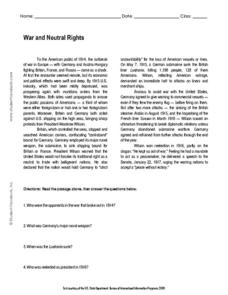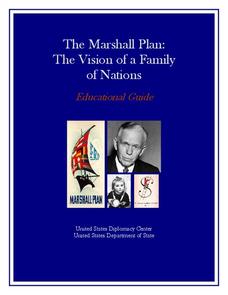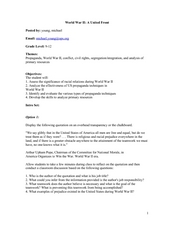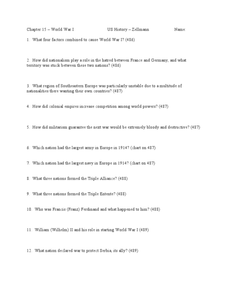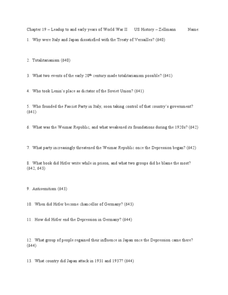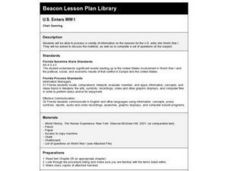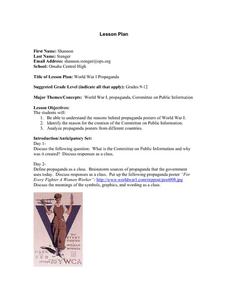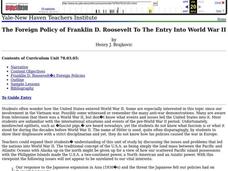Student Handouts
War and Neutral Rights
Teach your class about neutral rights with a brief reading selection and related questions. Pupils read the passage and answer the four questions on the bottom half of the page. Useful for a homework assignment or a quick warm-up, this...
Stanford University
Public Housing
The Fair Deal was meant to give Americans after World War II a basic standard of living. Those in public housing often found that promise fell short. Learners consider whether the effort was successful by evaluating images, testimonies,...
PBS
Using Primary Sources: Nazi Spy Ring Busted
Spy games are not just for professionals anymore! Scholars use short video clips, primary documents, and photographs to investigate Nazi spies in America during World War II. The young detectives analyze the paranoia warfare can create...
National Woman's History Museum
Women, Propaganda, and War
Governments rely on propaganda to build support for wars. Class members examine six propaganda posters, two each from the Spanish-American War, World War I, and World War II, and analyze how the way women were portrayed in the posters...
National WWII Museum
Dr. Seuss and WWII
What famous children's author and illustrator created World War II political cartoons featuring such subjects as fascism, the war effort, discrimination, and the dangers of isolationism? The who in this story is Dr. Seuss, and what...
US Department of State
The Marshall Plan: The Vision of a Family of Nations
The European Recovery Act (aka the Marshall Plan) was designed to bring together and develop a spirit of cooperation among European nations after World War II. Class members examine the materials from the Marshall Plan exhibit and assess...
DocsTeach
Two Versions of FDR's Infamy Speech
Historians follow FDR's Infamy speech from rough draft to the official address to the Senate. An intriguing activity compares and contrasts FDR's original speech to the official version. Academics also listen to FDR address the Senate....
Curated OER
World War II: A United Front
High schoolers interpret historical evidence presented in primary resources. In this World War II lesson, students examine racial relations during the war and then examine propaganda techniques employed by the United...
Curated OER
Causes of World War II
In this World War II worksheet, learners view a PowerPoint presentation on the war and then respond to 82 short answer questions about the content of the presentation. The PowerPoint presentation is not included with this worksheet.
Curated OER
World War 1 Crossword
In this World War I learning exercise, learners fill in a crossword that asks questions about World War I. Students fill in 15 answers to the crossword.
Curated OER
World War 1 Crossword
In this World War I activity, learners fill in a crossword that asks questions about World War I. Students fill in 12 answers to the crossword.
Curated OER
World War II, India, Gandhi, and Pakistan
In this Asian studies worksheet, students read the noted pages in their textbooks and then respond to 12 short answer questions about Southeast Asia, World War II, Gandhi, India, and Pakistan.
Curated OER
Who Started World War I?
Students debate which power was responsible for the outbreak of World War I. In this cause and effects lesson, students research the causes of the outbreak of World War I on ProQuest in preparation for a (limited) reenactment of the...
Curated OER
Chapter 15 – World War I
In this World War I activity, high schoolers read assigned textbook pages regarding the war and respond to 51 short answer questions.
Curated OER
World War II: Causes and Consequences
Tenth graders examine Hitler's occupation of Europe and the Allies' efforts to fight it. In this World War II lesson, 10th graders examine how World War II changed American society, especially for women. Students analyze a print ad...
Curated OER
Introduction to World War II
Eleventh graders recognize why wars are started and identify and color 3 countries involved with World War II.
Curated OER
World War I and the Russian Revolution
In this World War I and the Russian Revolution worksheet, students read assigned textbook pages and respond to 91 short answer questions.
Curated OER
Chapter 19 – Leadup to and Early Years of World War II
In this U.S. history worksheet, students read assigned textbook pages that describe the involvement of the U.S. in World War II and respond to 48 short answer questions.
Curated OER
U.S. Enters World War I
Students explore the reasons why the United States entered into World War I and how that conflict effected the United States and Europe politically, economically and socially.
Curated OER
World War I Propaganda
Students interpret historical evidence presented in primary and secondary resources. In this World War I lesson, students examine the propaganda techniques used by different nations during the war and analyze examples. Students also...
Curated OER
The Unseen Army: Conscientious Objectors During World War II
Learners study World War II and why it was called "the Good War". In this World War II activity learners identify the different kinds of conscientious objectors.
Curated OER
Chapter 20 – World War II with the US
In this World War II learning exercise, students read assigned textbook pages regarding U.S. involvement in the war and respond to 51 short answer questions.
Curated OER
Quiz on World War 1 (The Ending)
In this World War 1 worksheet, students complete an 8 question multiple choice online interactive quiz about the ending years of World War 1. The quiz may also be printed and completed on paper.
Curated OER
The Foreign Policy of Franklin D. Roosevelt To The Entry Into World War Ii
High schoolers examine the U.S.A.'s entry into World War II, and Franklin DO. Roosevelt's foreign policy. They analyze the life of I.E.., the election of 1932, and the New Deal.


